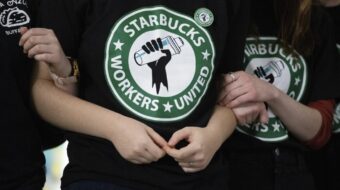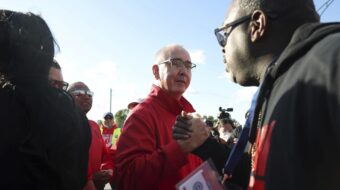
DETROIT – The tentative four-year contract between the United Auto Workers and FiatChrysler features gradual elimination of the two-tier wage system that the Detroit 3 automakers instituted after hitting the financial rocks during the Great Recession.
Elimination of that system is important. The pact, which covers 36,000 workers at FiatChrysler plants in the U.S., is supposed to be the “pattern contract” for the union’s bargaining with the other two Detroit-based automakers, Ford and the “new” General Motors.
But the pact’s details were drawing flak from UAW dissidents even before voting began in late September. They objected to the very gradual elimination of two-tier wages, a health care agreement between the company and the UAW, and the possibility that the pact lets FiatChrysler move plants and jobs to Mexico.
UAW leaders urged members to ratify the contract, which gives more-veteran “Tier 1” workers raises of 3 percent on ratification and again in September 2017, plus 4 percent lump sum bonuses in the pact’s second and fourth years. That prompted dissidents to say the Tier 1 workers’ pay would essentially stay flat, even after a decade of no raises at all.
Tier 1 workers now get around $28 hourly. Tier 2 workers will start at $17 an hour, a contract summary says. Tier 2 workers’ wages would rise to a maximum of $25.35 an hour after seven years. By the end of the contract, new hires in 2015 will rise to $22 an hour, with other workers rising to $23 or $24 an hour. All workers will also get a $3,000 signing bonus if the pact is ratified. Tier 2 covers about 45 percent of FiatChrysler workers.
“Back in 2007, we understood why we had to negotiate a two-tier wage structure,” UAW President Dennis Williams and Chrysler Department Vice President Norwood Jewell said in a letter to workers. “But that was then and this is now,” as the Detroit car firms are profitable.
“Now is the time to share in those gains. Your bargaining committee has taken a thoughtful and strategic approach to addressing this inequity over time in a way that allows the company to continue to invest in its plants, develop new product and keep our jobs secure.”
The health care system that FiatChrysler and the UAW agreed to is a version of the Voluntary Employee Benefits Agreement (VEBA) the Detroit 3 and the UAW created after the Great Recession hit. The VEBA covers retirees and the UAW runs it, with the automakers funding it through a complicated stock arrangement. Williams, in his cover letter, says the union wants to extend the VEBA to active workers at Ford and GM too, producing a larger pool of workers and economies of scale the union can use in negotiating health care costs.
The union and the firm also agreed to discuss – in the future – what to do about the so-called “Cadillac tax” that takes effect, under the federal Affordable Care Act, in 2018. That levy taxes so-called “high value” health care plans, many of which are union plans.
The Steelworkers, the Communications Workers, the Laborers and other unions have banded together in a coalition to roll back the Cadillac tax before it fully takes effect. The Cadillac tax is supposed to force people to buy cheaper health insurance – but its revenues also help pay for the money needed to cover the uninsured.
The dissidents urged a “no” vote against the pact. “Both FiatChrysler and the UAW are working to create even more divisions between workers within the plants, pitting young against old in a drive to increase productivity through relentless speed-ups. The deal includes a special profit-sharing provision for tier-two workers that kicks in when FCA has a North American profit margin of more than eight percent,” one dissident blog said.
Photo: An assembly line worker builds a Chrysler automobile. | Paul Sancya/AP












Comments